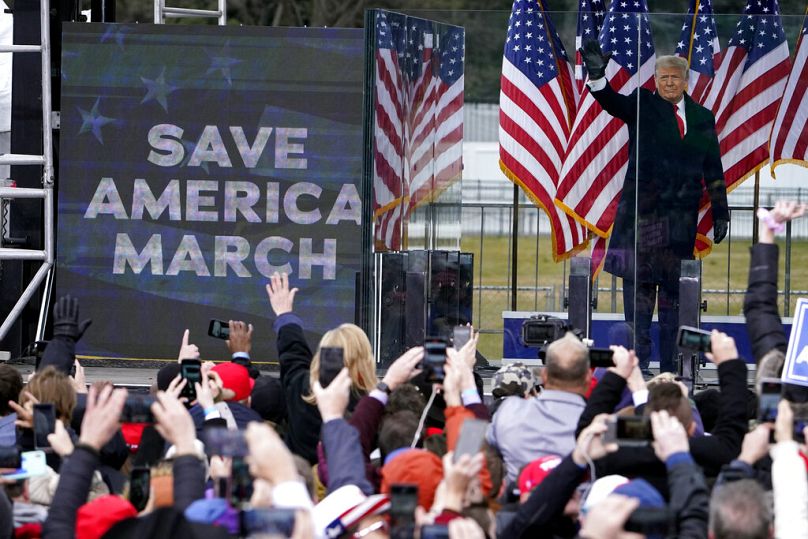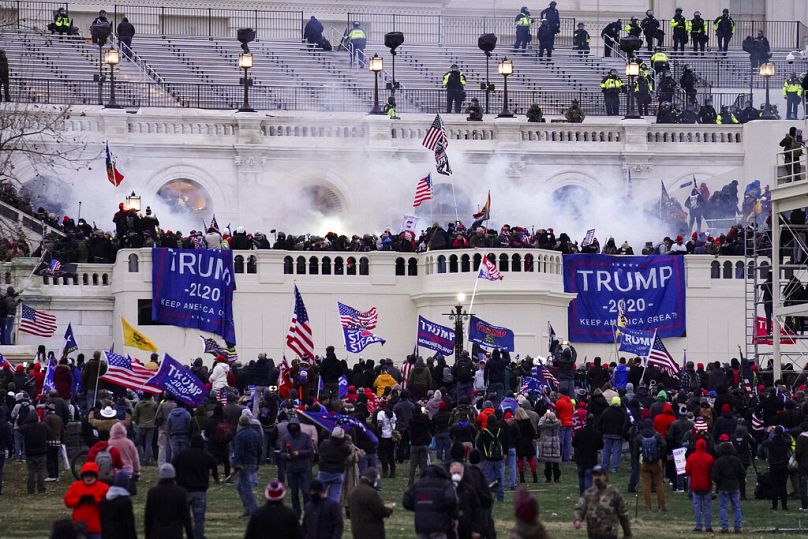Donald Trump's behaviour before and during 2021 attack on Congress have already seen him struck from ballot in more than one state.
The Supreme Court on Thursday will hear former President Donald Trump's appeal to remain on the 2024 ballot, the justices' most consequential election case since Bush v Gore in 2000.
The court will weigh arguments over whether Trump is disqualified from running for the White House again because of his efforts to delegitimise and overturn the 2020 election result, a saga that came to a head with the attack on the US Capitol by a horde of Trump supporters on January 6 2021.
The case marks the first time the justices will be considering Section 3 of the 14th Amendment, a constitutional provision that was adopted after the Civil War to prevent former officeholders who "engaged in insurrection" from holding office again.
It makes the court the final arbiter of a political dispute, a position it usually wants to avoid.
The Colorado Supreme Court ruled last year that Trump incited the Capitol riot and is ineligible to be president again. The decision is the first time that the provision in the 14th amendment was applied to a presidential candidate.
Assuming the ruling is allowed to stand, Trump will not be on the ballot for the state's March 5 Republican primary.
Trump's lawyers argue that the 14th amendment can't be used to keep Trump off the ballot, citing several arguments.
They contend the January 6 riot wasn't an insurrection – and that even if it was, Trump did not participate.
The Trump team also argues that tge wording of the amendment also excludes the presidency and candidates running for president. And even if they're wrong about all of that, they say, Congress must pass legislation to reinvigorate Section 3.
Conversely, the lawyers for the Republican and independent voters who sued to remove Trump's name from the Colorado ballot counter that there is ample evidence that the events of January 6 constituted an insurrection and that Trump incited it.
They say it would be absurd to apply Section 3 to everything but the presidency or that Trump is somehow exempt, and insist the provision needs no enabling legislation.
Dire implications
A definitive ruling in Trump's favour would largely end efforts in Colorado, Maine and elsewhere to prevent his name from appearing on the ballot.
A decision upholding the Colorado decision would amount to a declaration from the Supreme Court that Trump did engage in insurrection and is barred by the 14th Amendment from holding office again. That would allow states to keep him off the ballot and imperil his campaign.
The justices could opt for a less conclusive outcome, but with the knowledge that the issue could return to them, perhaps after the general election in November and in the midst of a full-blown constitutional crisis.
Trump is separately appealing to state court a ruling by Maine's Democratic secretary of state, Shenna Bellows, that he was ineligible to appear on that state's ballot over his role in the Capitol attack. Both the Colorado Supreme Court and the Maine secretary of state's rulings are on hold until the appeals play out.
The court has signalled it will try to act quickly, dramatically shortening the period in which it receives written briefing and holds arguments in the courtroom.
Before the Supreme Court is even finished deciding this case, the justices almost certainly will be dealing with another appeal from Trump, who is expected to seek an emergency order to keep his personal election subversion trial on hold while he appeals lower-court rulings that found he is not immune from criminal charges.
In April, the court also will hear an appeal from one of the more than 1,200 people charged in the Capitol riot. The case could upend a charge that prosecutors have brought against more than 300 people, including Trump himself.
The Supreme Court also boasts a political lightning rod of its own in the form of hardline right-wing Justice Clarence Thomas.
The only member of the court who also took part in Bush v. Gore, the case that effectively decided the 2000 election, Thomas has ignored calls by some Democratic lawmakers to step aside from the case because of the behaviour of his wife, Ginni.
A longtime conservative activist, she aggressively lobbied in favour of Trump's effort to overturn the 2020 election results and even attended the rally that preceded the storming of the Capitol. Critics say her conduct means her husband should recuse himself from all January 6-related cases, but he has so far declined.













